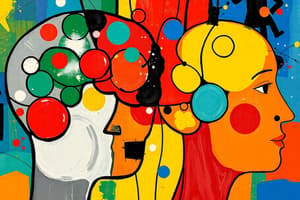Podcast
Questions and Answers
Vad är en skådespelare?
Vad är en skådespelare?
- En person som skriver manus för teaterpjäser.
- En person som agerar inom en struktur/spelplan. (correct)
- En person som skapar scendekorationer.
- En person som sjunger i en kör.
Vad inkluderar begreppet frihet?
Vad inkluderar begreppet frihet?
- Både positiva och negativa rättigheter. (correct)
- Endast negativa rättigheter.
- Inga rättigheter alls.
- Endast positiva rättigheter.
Vad innebär integritet?
Vad innebär integritet?
- Rätten till personlig integritet och värdighet. (correct)
- Rätten att äga egendom.
- Rätten att bryta mot normer.
- Rätten att utöva makt över andra
Vad innebär suveränitet?
Vad innebär suveränitet?
Vad är normer?
Vad är normer?
Vad är sanktioner?
Vad är sanktioner?
Vad är makt?
Vad är makt?
Vilka typer av makt finns det?
Vilka typer av makt finns det?
Vad kan rättvisa delas upp i?
Vad kan rättvisa delas upp i?
Vilka principer ingår i distributiv rättvisa?
Vilka principer ingår i distributiv rättvisa?
Flashcards are hidden until you start studying
Study Notes
- An actor is someone who acts within a structure/game plan.
- Freedom is a broad concept that includes positive and negative rights.
- Integritet is the right to personal privacy and dignity.
- Sovereignty is the right of a state to self-determination.
- Norms are unwritten rules within a structure.
- Sanktioner are punishments for breaking norms.
- Power is the ability to influence/change structures.
- There are different types of power, including coercive, reward, expert, and referent power.
- Justice can be divided into distributive and compensatory/retributive justice.
- There are three principles of distributive justice: equality, need, and merit.
Studying That Suits You
Use AI to generate personalized quizzes and flashcards to suit your learning preferences.




